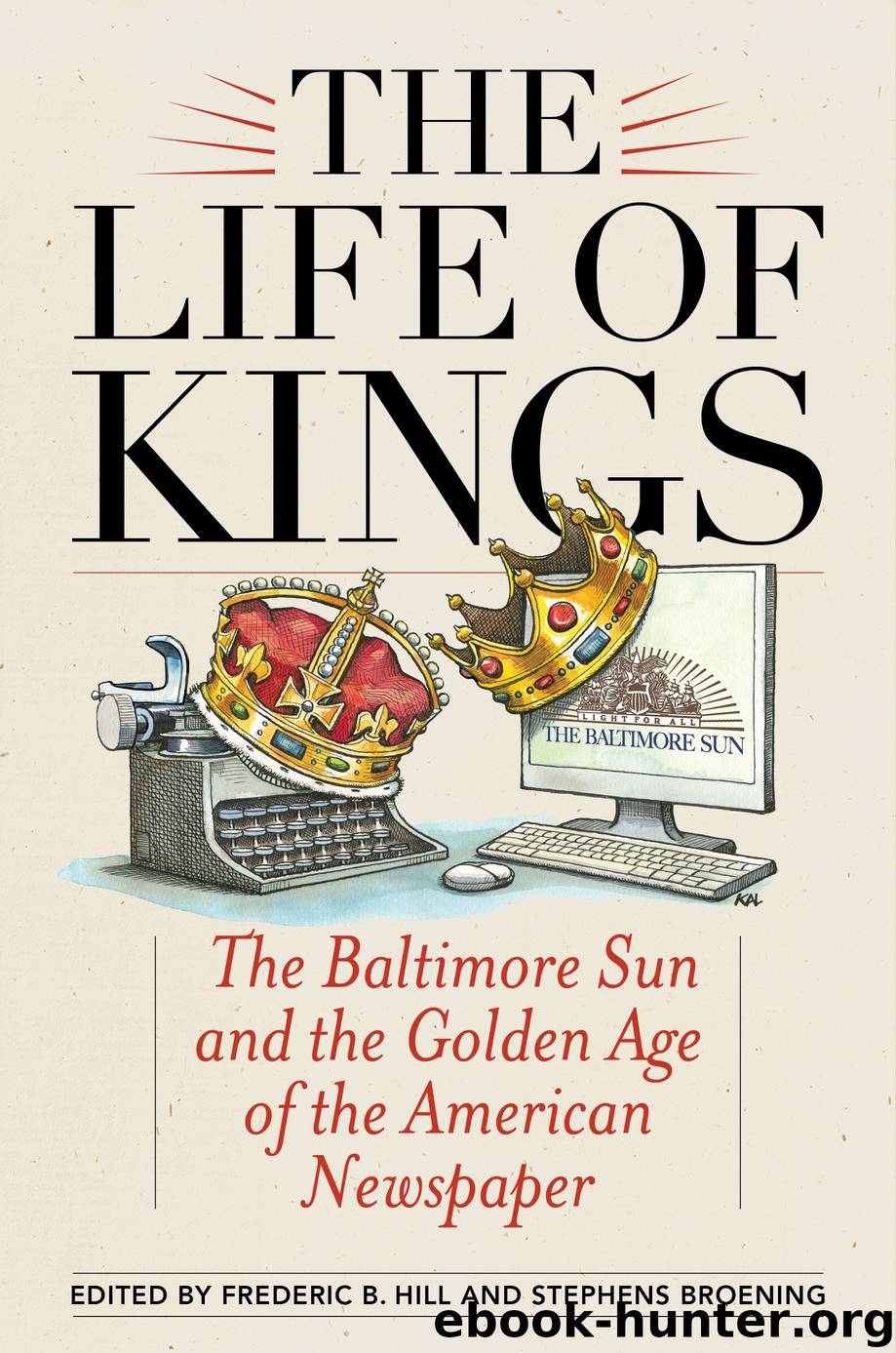The Life of Kings by Frederic B. Hill & Stephens Broening

Author:Frederic B. Hill & Stephens Broening [Hill, Frederic B. & Broening, Stephens]
Language: eng
Format: epub
Publisher: Rowman & Littlefield Publishers
Published: 2016-12-10T16:00:00+00:00
Figure 13.1. Raising a schooner of Arrow beer, H. L. Mencken celebrates the end of Prohibition with friends at the Rennert Hotel, April 7, 1933.
Courtesy of Baltimore Sun Media Group, all rights reserved.
I knew some of them from earlier in my career. One example was Jacob Beam, who was ambassador to Moscow when I was a correspondent there. Another was Robert W. Tucker, the international relations theorist who had been my adviser at Johns Hopkins. Most memorable for me in this class of contributors was Alexander I. Solzhenitsyn, the Nobel laureate who had been expelled from the Soviet Union.
Following a visit I paid him during his exile in Vermont, Solzhenitsyn sent me an article which asked Russian émigrés for personal reminiscences to stock a library of memoirs he intended to set up in Russia “as soon as conditions permit.” He was already counting on the downfall of the communist regime.
His request was directed at the generations that had experienced the 1920s, 1930s, and the German–Soviet war. He appealed for memoirs—short or long—that “bear upon the history of Russia in the twentieth century . . . so that our sorrow and our suffering may not vanish without a trace, but that it may remain in the memory of our people and serve as a warning for the future.” He said the documents would be gathered and held for “a time when it will no longer be a criminal offense in our country to remember our history.”
More typical contributors to the page were the kinds of experts quoted in newspaper stories, or newsmakers themselves: politicians, advocates, and, in one case, the longtime third baseman of the Baltimore Orioles who was marked for baseball’s Hall of Fame—Brooks Robinson.
When he retired in 1977 at forty years of age, I asked Robinson to write a piece about leaving the game. He later called to say his article was ready. Would I mind coming to Memorial Stadium to get it?
I had been watching him practically since the time in 1955 when the parent club brought him up from Rochester. So familiar to me were his moves on the diamond that I could almost mimic them, though not with his predatory quickness. We had never met, but I would have recognized him in a snowstorm. When we did, he extended his hand and said, as if I wouldn’t know, “Hi. I’m Brooks Robinson.”
The article he gave me was handwritten, and, like everything about him, authentic, understated. He said that up to mid-season he had intended to play ball indefinitely, but his body was starting to let him down, and it was clear he could no longer do things that had come so naturally before. He played in only twenty-four games in 1977, batting a pitiful .149. All the same, the decision to quit was hard. “Bodies may change and weaken in some ways, but the desire to play the game is much more difficult to relinquish than anyone who hasn’t played can imagine,” he wrote.
Download
This site does not store any files on its server. We only index and link to content provided by other sites. Please contact the content providers to delete copyright contents if any and email us, we'll remove relevant links or contents immediately.
| Africa | Americas |
| Arctic & Antarctica | Asia |
| Australia & Oceania | Europe |
| Middle East | Russia |
| United States | World |
| Ancient Civilizations | Military |
| Historical Study & Educational Resources |
Cat's cradle by Kurt Vonnegut(15334)
Pimp by Iceberg Slim(14484)
4 3 2 1: A Novel by Paul Auster(12372)
Underground: A Human History of the Worlds Beneath Our Feet by Will Hunt(12085)
The Radium Girls by Kate Moore(12017)
Wiseguy by Nicholas Pileggi(5769)
The Fire Next Time by James Baldwin(5431)
Perfect Rhythm by Jae(5398)
American History Stories, Volume III (Yesterday's Classics) by Pratt Mara L(5298)
Paper Towns by Green John(5177)
Pale Blue Dot by Carl Sagan(4996)
A Higher Loyalty: Truth, Lies, and Leadership by James Comey(4952)
The Mayflower and the Pilgrims' New World by Nathaniel Philbrick(4490)
The Doomsday Machine by Daniel Ellsberg(4484)
Killers of the Flower Moon: The Osage Murders and the Birth of the FBI by David Grann(4435)
The Sympathizer by Viet Thanh Nguyen(4384)
Too Much and Not the Mood by Durga Chew-Bose(4337)
The Borden Murders by Sarah Miller(4312)
Sticky Fingers by Joe Hagan(4188)
